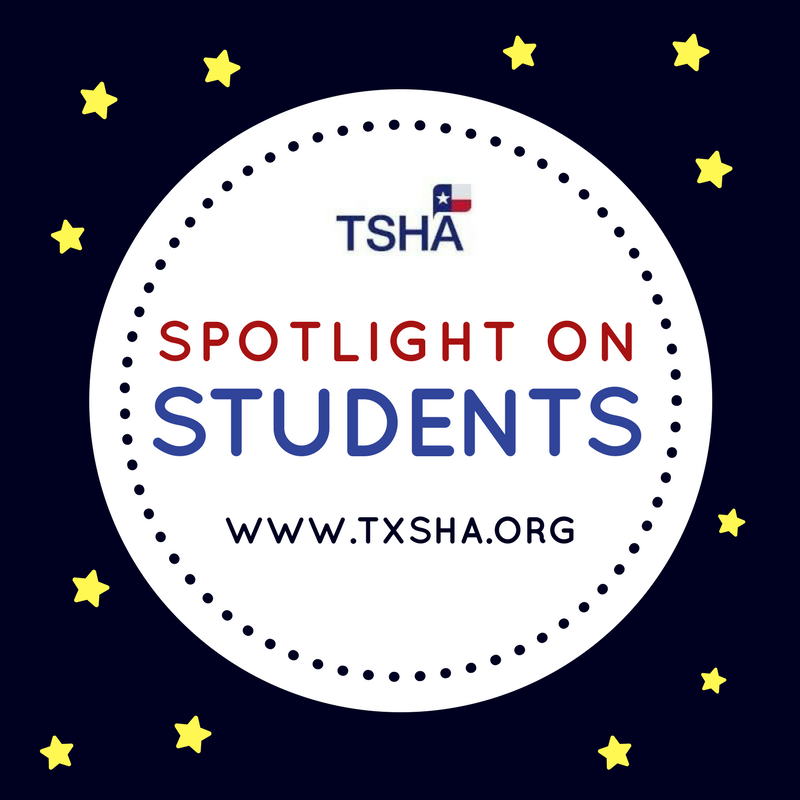
By Emily Gruver, BS, BA, TSHA Graduate Student Representative
Graduate school presents students with many challenges. We are fortunate to be preparing for professions that provide us with a great deal of flexibility in interest and opportunity. However, that flexibility results in many choices that we must make along the way. Making choices can add to our stress.
Both the American Speech-Language-Hearing Association (ASHA) Council for Academic Accreditation (CAA) and the Council for Clinical Certification (CFCC) require that all graduates be provided the depth and breadth of knowledge to prepare them to work in all clinical settings, with all clients from infants to the elderly and who exhibit all types of communication and swallowing challenges. Many students, however, feel pressured to determine areas of specialization early on in their graduate training. Preference for adults or pediatrics, medical or school settings, intention to go into private practice, or specific interest in perhaps neurogenic disorders or autism are possible choices some students can make at the beginning of graduate school. They may have even chosen their graduate program due to opportunities at a specific university in their areas of interest.
Yet, most new graduate students feel ill-prepared to make those choices. After all, most have never seen or experienced many of the settings and clinical experiences that will provide them with employment opportunities once they graduate. The ASHA CAA and CFCC have designed curriculum and clinical education requirements to require graduate students to engage in diverse curriculum and academic experiences. Why then do students feel pressured to make choices about their future early on in their graduate programs?
Could it be that faculty are asking students, “What are you interested in?” That question is commonly asked of students. Is the intention of faculty to make students feel pressured to have a firm answer? No. The intention, instead, is to enable guidance for those students who do have a specialty interest to take full advantage of opportunities available. In fact, the most frequent answer to that question is “I don’t know” or “I love it all.”
Could the pressure to make a choice be coming from peers? Do you have friends telling you they would “never work in the schools” perhaps? Should that make you doubt your willingness to consider the option? Or did a peer share a horror story about their hospital experience, making you doubt your interest in hospitals? Or were you sitting at a table with your friends when you suddenly realized you are the only one who seems to have no clue about where you ultimately want to work? Peer interaction can certainly add to your stress about the choices you have to make.
But guess what? We are not required to make that choice until we apply for jobs, and that is a long way away for a new graduate student. We should embrace the flexibility in our field and enthusiastically pursue new, exciting, and surprising opportunities outside our current interests because interests can—and often do—change. Faculty, in turn, need to encourage students to embrace all of the opportunities before eliminating any choices.
As a graduate student who enjoys all environments and ages, I have felt alienated in discussions and classrooms as professors and classmates ask about my interests. By being undecided, I feel as though I am behind in my future professional career as though being committed to one path would provide me with more job opportunities and success. I laud my peers who know what their futures hold, but they select only practicum opportunities that fit their preferences and never search for unfamiliar and unpredictable clinical experiences that will broaden their horizons and improve their ability to work with all people. As speech-language pathologists and audiologists, we must learn to work with all populations in all settings, and this begins in graduate school. I am proud of my indecision, and if you are in the same place, you also should be proud. We are the ones who will gain the most from our graduate educations.
Some individuals set off down a path from which they never deter, and that is wonderful for them. Most people, however, change their minds and end up in a role that is different from where they began, and that is wonderful as well. For these people who change their minds and seek change, it is imperative that they have a foundation to change jobs and understand other ages, cultures, and settings, which starts during graduate school clinical practicum experiences. These experiences solidify a wide skill base for students to pull from in whatever role they might hold, and not encouraging diversity in these experiences holds students back from becoming well-rounded clinicians, employees, and people.
Unfortunately, speech-language pathologists and audiologists can fall victim to legislative and vocational changes that impact the nature of our jobs. These changes may result in the loss of a role or transfer to a new department, but professionals must learn to adapt. With a background in a variety of clinical experiences, these individuals can be prepared for changes and quickly adapt, leading to decreased burnout and improved success. Graduate school is the ultimate preparation for a clinical career, and variety in practicums ensures that these future professionals always land on their feet.
Diverse experiences in graduate school help us to step out of our comfort zones, better preparing us for this ever-changing world. Even as a pediatric- or adult-focused graduate student, there is much knowledge to be learned from “the other side.” Pursue it, improve your ability to help all people with speech-language-hearing disorders, and become the most informed and prepared clinician you can. Make your next practicum experience one that challenges you and adds a new element to your clinical skillset.